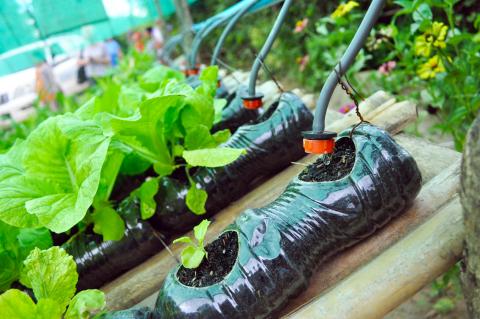
U Pan Sein lives in Thain Kone Village, Taunggyi Township. He owns a 0.8 acre farm and it is one of the eight demonstration farms for a newly introduced drip irrigation system in Southern Shan State.
The drip system has long been known as an efficient method of irrigating, compared to the traditional water distribution systems that are labour-intensive and time-consuming. The drip system is installed with a water pump, pipes, and tubing. Utilising the system to its maximum capacity depends on access to electricity, land area, and water sources. The drip system saves water because it sends water directly to the roots and provides a good watering solution for farmers living in areas where water supplies are scarce.

The drip irrigation system installation project in Southern Shan State is part of Mercy Corps’ Making Vegetable Markets Work (MVMW) project funded by LIFT. Mercy Corps works with Marlarmyaing Irrigation Solutions Co., the partner responsible for managing demonstration farms and introducing this new system to farmers, and with further support from Asia Irrigation.
After participating in the MVMW programme, U Pan Sein says he has already benefitted from the drip irrigation system. “It is really effective to save time, water, and labour,” he said. His farm is located near a water source and he has access to electricity, so it only takes him one hour a day to release both water and fertiliser. He only needs to repeat the process every three to five days. He grows tomatoes and potatoes on his farm, and thanks to this new system, not long after the installation he had successfully harvested his first crops.
The MVMW programme hopes to expand the installation of drip irrigation system as a way to promote and support good agricultural practice. Knowing that the cost is slightly higher than traditional irrigation, the programme offers cost-share discounts through the newly-launched MVMW voucher-system. In order to help farmers set up drip irrigation, the programme provides MMK 136,000 (USD 100) per 0.1 acre. By doing so, it also hopes to reach more farmers and encourage them to make investments in advanced technologies for better vegetable production.


